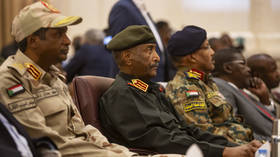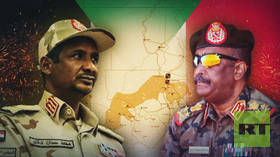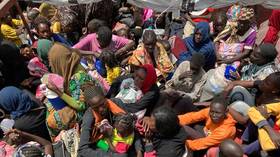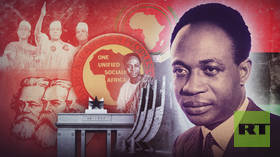How US policy is hindering peace in this war-torn African state

The war in Sudan between the Sudanese Armed Forces (SAF), led by the de-facto head of state, Abdel Fattah al-Burhan, and the Rapid Support Forces (RSF), controlled by Mohamed Hamdan Dagalo ‘Hemedti’, has been raging since April 2023 and has reached a critical juncture with the failure of the latest US-mediated peace talks.
The RSF was officially formed in 2013 and grew out of nomad militia which previously fought on behalf of the Sudanese government. However, contradictions within the army and between the two generals, Abdel Fattah al-Burhan and Dagalo ‘Hemedti’, his former deputy in the Sudan Transitional Sovereign Council, over the transition to civilian rule and the role of the RSF in the army has led to the current political and military stalemate.
The brutal conflict has forced 12 million people to flee their homes, with over 2 million seeking refuge in neighbouring countries and nearly 10 million internally displaced. This is the largest displacement crisis in the world, with reports of acute shortages of food, medicine, and shelter supplies.
The Geneva talks, organized last month by US Secretary of State Antony Blinken, aimed to address the dire humanitarian situation and establish a ceasefire. However, the effort failed. Notably absent from the negotiations was one of the two warring sides, the Sudanese army, a decision that has raised significant questions about any potential for peace in the near future.
Before the talks started, a consultative meeting was held in July in the Saudi city of Jeddah between the Sudanese consultative delegation, headed by the minister of minerals, Mohammed Bashir Abu Nomu, and the US special envoy for Sudan, Tom Perriello. This meeting followed a number of previously held peace initiatives and forums in addition to the last Jeddah Declaration, which failed.
The declaration, signed on May 11, 2023, emphasised the responsibility of the parties to protect civilians, respect international humanitarian law, and resume humanitarian operations. Initially a military document of intent, the declaration, however, later transformed into a political document when the US government insisted on involving the paramilitary RSF in the upcoming political process. The government side (the SAF and the Sudanese Sovereignty Council) rejected this move, insisting that the RSF is a rebel force that launched a war against the army and civilians.
At the Jeddah meeting, a number of reasons were cited by the Sudanese delegation explaining their refusal to take part in the Geneva talks.
First, according to the Sudanese side, the US delegation lacks commitment to push the rebel forces to comply with the implementation of the Jeddah Declaration, especially with regard to the clause on the protection of civilians. Since the outbreak of the conflict, according to an Amnesty International report in 2023, “mainly RSF and allied militias” have been attacking civilians, causing widespread destruction and torture; reports of sexual violence and forced recruitment of children and youth have been also widespread.
The US then insisted on the involvement of the UAE in the Geneva talks, which the Sudanese side also rejected, having explained this by the UAE’s alleged financial and military support for the rebel RSF. This support, according to Lieutenant General Yasser al-Atta, commander-in-chief of the SAF and a member of the transitional Sudanese Sovereignty Council, amounts to hundreds of millions of dollars and is aimed at strengthening the country’s influence in Sudan and protecting its economic and strategic interests. This Emirati support has been criticized by some countries and international organizations as it deepens and complicates the Sudanese crisis. As the UAE has allegedly provided humanitarian aid to RSF-controlled areas while also logistically supporting the RSF, UN experts have identified three main routes for RSF supplies, including Umm Jars airport in eastern Chad, East Central Africa, South Sudan, and southern Libya.
Sudan’s complaint to the UN filed in June accuses the UAE of carrying out a plot against Sudan through the RSF militia. According to this complaint, the UAE’s actions constitute a threat to regional and international peace, an act of aggression, a breach of peace, a violation of Sudan’s sovereignty, and unlawful interference, violating Security Council Resolution 1591 of 2005.
Another reason for Sudan’s refusal to take part in the peace talks was the fact the US delegation did not justify the establishment of a new platform during the consultative meeting. Though it should be noted that multiple platforms could dissipate the solution efforts and thus complicate the political stalemate, the US and UAE involvement has thus far seemed ineffective, probably due to a crucial misunderstanding. This is the overly simplistic portrayal of the conflict as a struggle for power between the SAF and the RSF. While this is a central aspect, it ignores the complexity of ethnopolitical dimensions, regional dynamics, and economic interests that fuel the violence. This reductionist perspective hinders the development of comprehensive peace plans which should address the root causes of the conflict.
Apparently, if General Abdel Fattah al-Burhan, the SAF chief and de-facto Sudanese leader, had decided to participate in the Geneva talks, it would have been the best scenario for the US, but the worst for the Sudanese army and the vast majority of the Sudanese people. Because al-Burhan, by accepting the invitation on the basis of his status as army commander, would have lost his constitutional legitimacy as head of the Transitional Sovereignty Council, in addition to being equated with the rebel faction, which implies his acceptance of the return of the RSF to the Sudanese political scene. This would have meant rewriting the political and legal characterization of the RSF in a manner similar to what was done to John Garang and Minni Minnawi.
John Garang, one of key figures in modern Sudan’s history, led the SPLM (Sudan’s People Liberation Movement) during the Second Sudanese Civil War (1983-2005). The SPLM gained significant political power through the Comprehensive Peace Agreement (CPA) signed in 2005, leading to South Sudan’s eventual independence. The same happened with Minni Minnawi, the leader of the Sudan Liberation Army (SLA) during the Darfur conflict, who signed the Darfur Peace Agreement in 2006, transforming his role into a government ally. This agreement demonstrates how rebel leaders can transition into political figures through negotiations.
If General al-Burhan engages with the RSF in a manner similar to the government’s past dealings with Garang and Minnawi, it could indicate a shift towards a political solution, recognising the RSF as a political entity for negotiations, redefining its role in Sudan’s ongoing conflict. This could signal a potential restructuring of Sudan’s political landscape, where military and rebel groups are integrated into the formal political process.
Thus, the Sudanese army would be perceived as a parallel faction to the rebel RSF. The RSF commander Mohamed Hamdan Dagalo ‘Hemedti’ and his brother Abdelrahim Dagalo would be reinstated to their previous positions as deputy chairman of the Sovereignty Council, and the RSF’s assets would be unfrozen in banks, hypothetically. This would turn the negotiations from military-humanitarian, in accordance with the Jeddah Declaration, into political ones, thus returning the RSF and its allies to the political front – something that the Sudanese army can’t accept.
American mediation efforts could have made some sense if the conditions of both the warring sides had at least been part of preliminary discussions, even if they were not met. However, a one-sided vision leads any negotiating process to a stalemate.
The statements, views and opinions expressed in this column are solely those of the author and do not necessarily represent those of RT.















